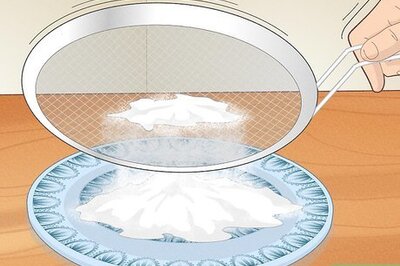
views
An average person spends 813 days in the bathroom throughout their life — that’s over 2 years of your life. Your toilet is more important than you think.
Sanitation is a human right. Everyone is entitled to clean toilets that provide privacy, ensure dignity and safety, and that are physically accessible and affordable. Sanitation is also a public good, providing benefits across society in improved health as well as economic and social development. The lack of safe and clean toilets and poor sanitation practices leads to illness and disease that disproportionately affect children, including diarrhoea, worm infections and stunting.
Even for those families that have access to their own personal toilet, maintaining adequate toilet hygiene and good sanitation practices are key to avoiding these diseases and maintaining strong immune function.
By and large, the responsibility of toilet hygiene in urban homes defaults to the hired help, irrespective of their education level. Often, despite our education, most of us don’t know enough about maintaining good toilet hygiene. This is a fact that India’s leading lavatory care brand, Harpic, is well aware of. Over the years, Harpic has led several campaigns that address toilet hygiene and the various small steps that families can take to ensure that their family toilets are, indeed, safe.
Poor sanitation and bad toilet habits can affect everyone, and create a polluted environment that impacts the entire community, whether or not an individual household has a clean and well maintained toilet. At a community level, poor toilet sanitation leads to increased health care costs, lost income, forgone educational opportunities and costs resulting from pollution. It also disproportionately affects the most vulnerable and disadvantaged, particularly women and people living with disabilities. Sanitation workers, often stigmatized and marginalized, face unacceptable health risks and indignities in an unhealthy and unregulated environment.
In India, the GoI’s Swachh Bharat Mission remedied this by constructing millions of toilets, which is bringing tangible health benefits to these communities. Not only does the introduction of toilets reduce the burden on public health facilities by limiting spread of water borne and poor sanitation related diseases, the construction and maintenance of these facilities creates its own employment. Of course, healthier communities also miss fewer days of work and school.
The problem of mindsets
However, as the Sub-Group of Chief Ministers on Swachh Bharat Abhiyaan found, constructing toilets is just one half of the equation. We also need to bring about behavioural change when it comes to using toilets, and maintaining them. The Sub-Group of Chief Ministers recognised that they were succeeding with the youth – not only were young people more receptive to their message, they were also willing ambassadors of change within their families and communities.
This is reflected in the recommendations that the Sub-Group made regarding an education strategy that encompasses several key measures:
- Inculcating sanitation practices in children by including a chapter in the school curriculum from the first standard itself.
- In each school and college, a team of students may be formed which will be called the ‘Swachhata Senani’, to spread awareness about sanitation and cleanliness
- Skill Development courses/ Diploma courses may be introduced in State ITIs and polytechnics/ colleges to train personnel in the field of solid and liquid waste management.
- Specialised courses on Environmental Sciences, Public Health Engineering and Municipal Engineering with focus on sanitation and waste management may be introduced at undergraduate and postgraduate level.
- Joint Research Programmes with foreign universities/higher educational institutions would enhance knowledge and capacities to work on waste management technologies.
They also came up with several recommendations on how to create a stronger Behaviour Change Communication (BCC) strategy by involving measures like:
- Involving political and social/thought leaders, celebrities and media houses to spread the message of the importance of cleanliness and sanitation.
- Extensive media campaigns in the form of electronic, web and print to be used for conveying messages and encouraging the people to pay for usage of public toilets for their sustainability.
- Advocacy of the concept of three R’s: Reduce, Reuse and Recycle.
- Communications to ensure that cleaning occupations must be seen as dignified work and widely respected.
These recommendations didn’t just live on paper.
To ensure the efficient management of both organic and inorganic waste, the district administration of Howrah in West Bengal held a training programme on solid waste management for members of Self-Help Groups. Street plays motivated people to use toilets and to keep them clean in Koppal District, Karnataka. 28 year old Abhishek Kumar Sharma has spent one year cycling across India, carrying critical toilet sanitation messages to people in villages and towns across the country. He aims to change the mindset of people and stress on the fact that only when every household starts contributing, will we become a nation where everyone has access to a clean toilet. In Chhattisgarh, over 1 Lakh students wrote letters to their parents asking to build toilets for them. Chhattisgarh also drew inspiration from a 105-year-old woman who built her own toilet by selling off her goats. She was later chosen as a Swachh Bharat Abhiyan mascot.
The larger push towards cleaner toilets
Fortunately, it wasn’t just the GoI. Several public figures took up the mantle, and used their platforms to communicate the need for better toilet hygiene. Several led clean up drives in their localities, while several others took to social media to urge their followers to adopt toilets. Movies like Toilet: Ek Prem Katha and Pad Man sparked conversations in the right communities, and did a great job of addressing the common objections that government and non-governmental agencies faced when it came to toilet use and maintenance.
Of course, when it comes to keeping toilets clean and usable, the group that needs to be empowered most is the sanitation workers themselves. This is a profession that was, until very recently, not given its due respect and dignity. At the 2019 Kumbh Mela at Prayagraj, in an unprecedented gesture, PM Narendra Modi washed the feet of five sanitation workers, hailing them as Karma Yogis and expressing his gratitude for their service. This symbolic act sent a powerful message to the entire nation that sanitation workers are an essential part of society and their work needs to be recognized and respected.
Of course, Harpic has been working towards uplifting sanitation workers through the establishment of Toilet Colleges. Harpic has set up India’s first Toilet College in 2016, with the stated objective of improving the quality of life of manual scavengers through their rehabilitation by linking them with dignified livelihood options. The college operates as a knowledge sharing platform with an aim to uplift the lives of the sanitation workers by educating them about their rights, health hazards, use of technology and alternate livelihood skills. Workers trained by the college are provided placement with various organisations. Following the successful proof of concept in Rishikesh, World Toilet Colleges have opened in Maharashtra, Aurangabad, in partnership with Harpic, Jagran Pehel and Maharashtra Government.
Harpic, together with News18, created the Mission Swachhta aur Paani initiative 3 years ago. It is a movement that upholds the cause of inclusive sanitation where everyone has access to clean toilets. Mission Swachhta aur Paani advocates equality for all genders, abilities, castes and classes and strongly believes that clean toilets are a shared responsibility.
On April 7th, on the occasion of World Health Day, Harpic and News18 are bringing together a panel under the aegis of Mission Swachhta aur Paani, that comprises policy makers, activists, actors, celebrities and thought leaders together with Reckitt’s leadership and News18 to dwell on the problems of sanitation in India, and the solutions that are emerging.
The event will feature a keynote address by Reckitt leadership, interactive Q&A sessions, and panel discussions. The speakers include Union Minister of Health & Family Welfare, Shri Mansukh Mandaviya, Deputy CM of Uttar Pradesh, Shri Brajesh Pathak, Director of External Affairs & Partnerships, SOA, Reckitt, Ravi Bhatnagar, UP Governor Anandiben Patel, actors Shilpa Shetty and Kajal Aggarwal, Regional Marketing Director of Hygiene, Reckitt South Asia, Saurabh Jain, sportsperson Sania Mirza and Padma Shri S. Damodaran, Founder of Gramalaya, among others. The event will also feature on-ground activations in Varanasi, including a visit to Primary School Naruar and a ‘Chaupal’ interaction with sanitation heroes and volunteers.
India’s mindsets are our mindsets. We bear the responsibility of the changes we want to see. The way to a Swasth Bharat is through a Swachh Bharat. Join us here to learn about the many ways in which you can participate in the national conversation.
Read all the Latest News here


















Comments
0 comment